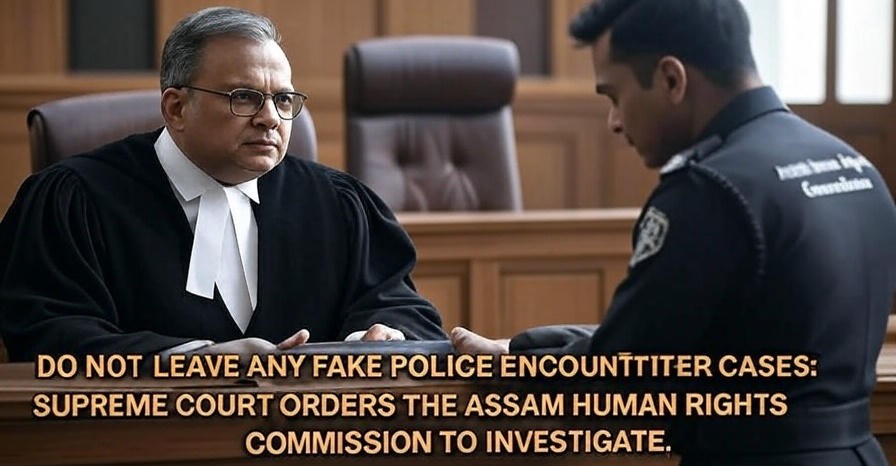INTRODUCTION
The Assam government was accused of breaking Supreme Court-mandated guidelines from the 2014 PUCL (People’s Union for Civil Liberties) case, which established the legal framework for looking into police encounters. The complaint was filed as a public interest litigation (PIL). On Tuesday, May 28, the Supreme Court ordered the Assam Human Rights Commission to look into claims of police fake encounter deaths in Assam.
The history of these charges and the proportion of such an order will be examined in this article. It will look at how the Assam Human Rights Commission operates and critically analyze instances of the idea of “fake police encounters.”
CASE HISTORY
The Assam government was accused of breaking Supreme Court-mandated guidelines from the 2014 PUCL (People’s Union for Civil Liberties) case, which established the legal framework for looking into police encounters. The complaint was filed as a public interest litigation (PIL).
A two-judge panel made up of Justices Surya Kant and NK Singh delivered the ruling and gave important instructions meant to guarantee an impartial and equitable investigation into the case.
The Court found a balance between the necessity of institutional inquiry systems and judicial control, even as it acknowledged the seriousness of the accusations.
“This case concerns police encounters in Assam,” stated Justice Surya Kant in his ruling. There is no justification for public officers to employ disproportionate or unlawful force. We have made it clear that just gathering cases does not call for judicial action because doing so can end up shielding the guilty.
He clarified that despite the petitioner’s extensive list of encounters—which included 117 distinct cases—the Court could not dismiss them as fraudulent without conducting a thorough analysis.
Therefore, we have stated that we have recognized the petitioner’s role since It is a significant accusation that it might involve phony encounters. Investigating to identify real cases is crucial. Procedural safeguards cannot be replaced by PILs. Justice ought to be tailored to each individual.
ADDITIONS BY THE BENCH
The Bench further stated that other allegations of non-adherence to the PUCL rules lacked factual support.
Numerous claims of non-compliance with PUCL guidelines were deemed to be factually false by the court. Additionally, our initial analysis shows that these accusations were unfounded. The public’s confidence in the rule of law depends on rigorous respect to procedural safeguards, as mandated by Article 21 of the Constitution.
The Court did not, however, rule out the potential that any of these purported meetings might in fact be dubious and require more research.
“In certain cases, more assessment may be necessary. It is not appropriate to interpret observations as disparaging state authorities, an independent and unbiased organization that must conduct the investigation.
The significance of human rights commissions in these areas was emphasized by Justice Surya Kant, who also pointed out recent advancements in the Assam Human Rights Commission’s (AHRC) leadership. In order to protect rights, state and federal human rights commissions are essential. We observe that a distinguished legal expert has taken over as the new head of the Assam Human Rights Commission. Therefore, we assign the Assam Human Rights Commission the task of conducting this investigation. The State Human Rights Commission’s 2022 ruling is hereby overturned, and the SHRC will take the issue up again.
He also urged authorities to handle the situation delicately and protect the privacy and safety of those who are impacted:
“It’s crucial to protect these identities… The commission will take a sensitive approach. It will have the freedom to start looking into the claims further. State of Assam to eliminate all institutional obstacles and provide complete cooperation.
Additionally, the Court ordered the Assam Human Rights Commission to make sure that the voices of impacted families are heard and to inform the public through newspapers.
“All parties involved will be notified about these proceedings by the State Human Rights Commission through notices, guaranteeing that impacted families have a chance to be heard.” In order to help with this process, the SHRC may also designate independent members. The state government is mandated to give the Commission the required resources and forensic support.
CONCERN REGARDING LEGAL REPRESENTATION OF PETITIONERS
Solicitor General Tushar Mehta voiced concerns about the petitioners’ legal representation during the hearing.
“I’ll just ask for one thing. Yes, however you might want to reconsider the last part. This counsel should not be provided by the Human Rights Commission.
Justice Surya Kant responded, “We have stated that they can engage him.”
SG Mehta warned that it could incite abuse.
Blackmailing might be encouraged by that. I apologize for using this my lord.
In a stern reply, Justice Surya Kant said, “Mr. Mehta, believe in the system. Anyone can engage him if they so want.
CONCLUSION
After a petitioner cited up to 171 instances of alleged phony police encounters in the state, the Supreme Court requested that the Assam Human Rights Commission (AHRC) look into the claims “for advancing it to its logical conclusion.”
A bench of Justices Surya Kant and N K Singh decided to file a Public Interest Litigation (PIL), noting that “after minutely scanning” the “data” that the petitioner had presented to it, “prima facie it seems that barring a few cases, it is difficult to infer that there has been a procedural breakdown or the PUCL guidelines were flagrantly violated.”

